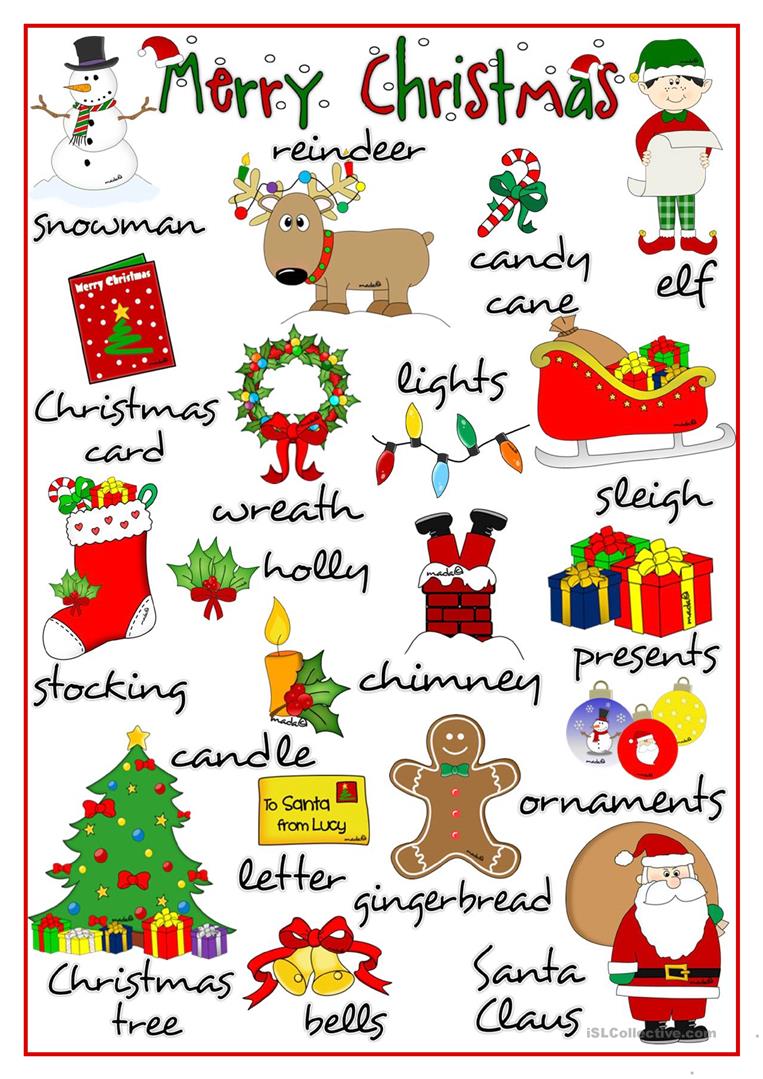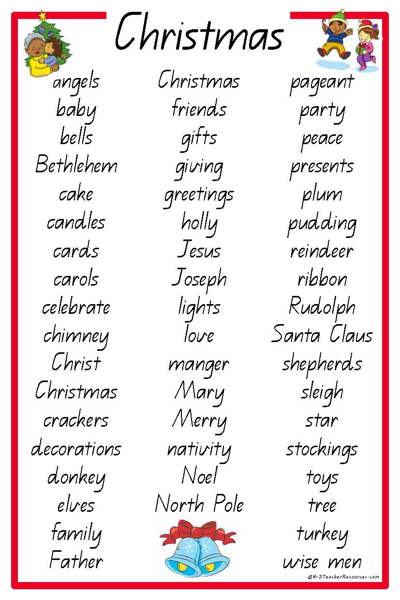A Festive Lexicon: Exploring Christmas Words For Children
A Festive Lexicon: Exploring Christmas Words for Children
Related Articles: A Festive Lexicon: Exploring Christmas Words for Children
Introduction
In this auspicious occasion, we are delighted to delve into the intriguing topic related to A Festive Lexicon: Exploring Christmas Words for Children. Let’s weave interesting information and offer fresh perspectives to the readers.
Table of Content
- 1 Related Articles: A Festive Lexicon: Exploring Christmas Words for Children
- 2 Introduction
- 3 A Festive Lexicon: Exploring Christmas Words for Children
- 3.1 The Importance of Christmas Vocabulary
- 3.2 A Comprehensive Christmas Word List for Children
- 3.3 FAQs about Christmas Word Lists for Kids
- 3.4 Tips for Introducing Christmas Vocabulary to Children
- 3.5 Conclusion
- 4 Closure
A Festive Lexicon: Exploring Christmas Words for Children

The holiday season is a time of joy, wonder, and, for children, a world of new vocabulary. Christmas, with its unique traditions and symbols, offers a rich tapestry of words to learn and explore. This article delves into the significance of introducing children to Christmas vocabulary, examining its benefits and providing a comprehensive list of words, categorized for easy understanding.
The Importance of Christmas Vocabulary
Learning Christmas words is not merely about expanding a child’s lexicon. It is about fostering a deeper understanding of the holiday’s essence, its traditions, and the emotions associated with it.
1. Cultural Understanding: Christmas vocabulary acts as a window into a specific cultural tradition. Children learn about the symbols, rituals, and stories that make Christmas unique, fostering a sense of belonging and appreciation for the holiday’s heritage.
2. Enhanced Communication: Understanding Christmas words empowers children to communicate effectively during the festive season. They can participate in conversations, read Christmas stories, and engage in holiday activities with greater confidence.
3. Reading Comprehension: Christmas vocabulary strengthens reading comprehension skills. Children can decode and understand Christmas-themed stories, poems, and songs more readily, leading to a deeper appreciation for literature.
4. Imagination and Creativity: Learning new words sparks imagination. Children can use their newfound vocabulary to create stories, write poems, and engage in imaginative play, enriching their creative expression.
5. Memory and Learning: Learning Christmas words strengthens memory and cognitive skills. Children associate words with specific images, sounds, and emotions, enhancing their ability to retain information.
A Comprehensive Christmas Word List for Children
This list is organized into categories to make learning fun and accessible:
1. Key Christmas Figures:
- Santa Claus: The jolly, gift-giving figure who lives at the North Pole.
- Mrs. Claus: Santa’s kind and helpful wife.
- Reindeer: Santa’s magical flying reindeer, including Rudolph with his bright red nose.
- Elves: The small, hardworking creatures who help Santa make toys.
- Snowman: A friendly figure made of snow, often with a carrot nose and a hat.
- Angel: A heavenly being, often depicted with wings, representing peace and goodwill.
2. Christmas Decorations and Symbols:
- Christmas Tree: A decorated evergreen tree, symbolizing life and joy.
- Ornaments: Decorations that adorn the Christmas tree, often reflecting personal memories or themes.
- Lights: Twinkling lights that illuminate the Christmas tree and home.
- Wreath: A circular decoration made of evergreen branches, often adorned with berries and ribbons.
- Mistletoe: A plant associated with good luck and kissing under its branches.
- Stocking: A long, sock-like container hung by the fireplace, waiting for Santa’s gifts.
- Gingerbread House: A delicious edible house made of gingerbread, decorated with candies and frosting.
- Candles: Symbolic lights that represent hope and joy during the holiday season.
3. Christmas Activities and Traditions:
- Carols: Festive songs sung during the Christmas season.
- Presents: Gifts given to loved ones as a symbol of love and generosity.
- Christmas Eve: The evening before Christmas, often celebrated with special dinners and traditions.
- Christmas Day: The day celebrating the birth of Jesus Christ.
- Boxing Day: A day of giving gifts to those less fortunate, celebrated in some countries.
- Santa’s Workshop: The magical place where Santa and his elves make toys.
- Christmas Feast: A special meal enjoyed on Christmas Day, often featuring traditional dishes.
- Christmas Story: The biblical story of the birth of Jesus Christ.
- Advent Calendar: A calendar with a small treat behind each door, counting down the days to Christmas.
4. Christmas Foods and Drinks:
- Eggnog: A creamy drink made with milk, eggs, and spices.
- Gingerbread Cookies: Spicy cookies shaped like people, animals, or Christmas symbols.
- Candy Canes: Red and white striped candies shaped like a cane.
- Hot Chocolate: A warm, comforting drink enjoyed during the cold winter months.
- Roast Turkey: A traditional Christmas dinner staple.
- Christmas Pudding: A rich, fruity dessert traditionally served on Christmas Day.
5. Christmas Feelings and Emotions:
- Joy: The feeling of happiness and delight associated with Christmas.
- Peace: The feeling of tranquility and goodwill that permeates the holiday season.
- Love: The feeling of affection and generosity shared with loved ones.
- Wonder: The sense of awe and excitement that surrounds Christmas traditions.
- Hope: The belief in the promise of a brighter future, often associated with the Christmas spirit.
6. Christmas Phrases and Sayings:
- Merry Christmas: A traditional greeting exchanged during the holiday season.
- Happy Holidays: A more inclusive greeting that acknowledges different cultural celebrations.
- Jingle Bells: A popular Christmas carol.
- Silent Night: A classic Christmas carol known for its peaceful melody.
- Deck the Halls: A phrase meaning to decorate for Christmas.
- Ho Ho Ho: Santa’s signature laugh.
- Peace on Earth: A message of goodwill and harmony.
FAQs about Christmas Word Lists for Kids
1. What age are Christmas word lists suitable for?
Christmas word lists are suitable for children of all ages, starting from toddlers. Younger children can learn basic words like "Santa," "tree," and "presents," while older children can explore more complex vocabulary related to traditions, stories, and cultural aspects of Christmas.
2. How can I make learning Christmas words fun for my child?
Learning Christmas words can be made fun and engaging through various activities like:
- Reading Christmas stories and poems together.
- Singing Christmas carols and songs.
- Playing Christmas-themed games and puzzles.
- Creating Christmas crafts and decorations.
- Visiting a Christmas market or attending a festive event.
3. Are there any resources available to help me teach Christmas vocabulary to my child?
There are numerous resources available to help teach Christmas vocabulary to children, including:
- Online flashcards and games.
- Christmas-themed picture books and coloring books.
- Educational apps and websites.
- Christmas vocabulary worksheets and activities.
Tips for Introducing Christmas Vocabulary to Children
1. Start Early: Introduce Christmas words gradually, starting from a young age. Begin with simple words and gradually introduce more complex vocabulary.
2. Make it Interactive: Engage children actively in learning. Use visuals, songs, games, and stories to make the experience fun and memorable.
3. Connect to Real-Life Experiences: Relate Christmas words to real-life experiences. For example, while decorating the Christmas tree, point out the ornaments and lights, explaining their names and significance.
4. Use Repetition: Repeat Christmas words frequently, incorporating them into everyday conversations and activities.
5. Encourage Curiosity: Foster children’s curiosity by answering their questions about Christmas traditions, symbols, and vocabulary.
6. Celebrate Success: Praise children’s efforts and celebrate their progress in learning Christmas words.
Conclusion
Learning Christmas words is an enriching experience for children, fostering cultural understanding, enhancing communication skills, and igniting imagination. By introducing children to the festive lexicon, parents and educators can help them appreciate the magic and joy of the holiday season while expanding their vocabulary and cognitive skills. This comprehensive word list, categorized for easy access, provides a foundation for a delightful and educational journey into the world of Christmas vocabulary.








Closure
Thus, we hope this article has provided valuable insights into A Festive Lexicon: Exploring Christmas Words for Children. We hope you find this article informative and beneficial. See you in our next article!
Leave a Reply